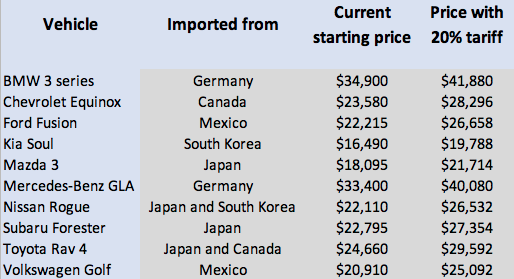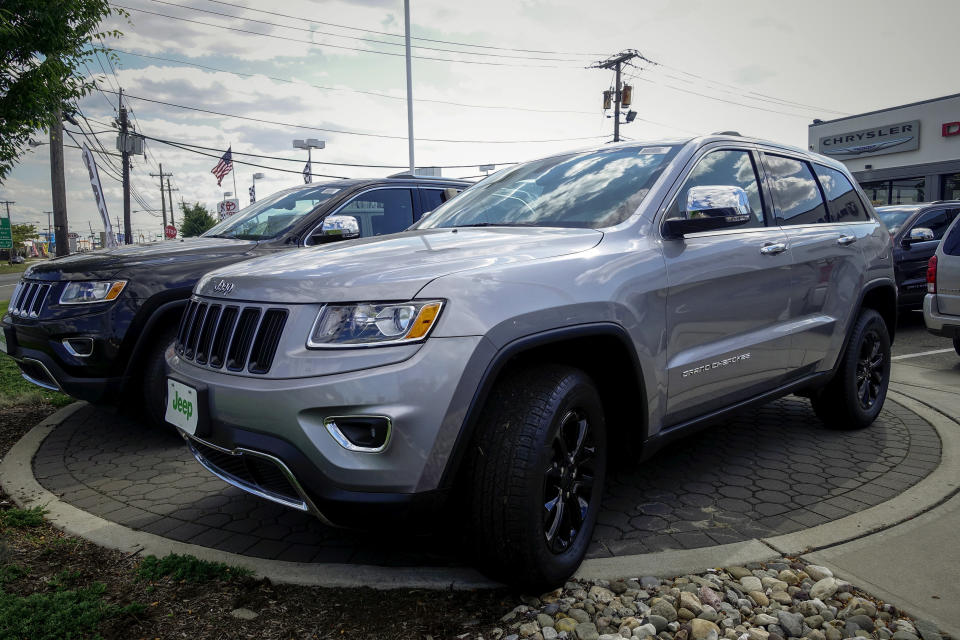Car prices would soar under Trump's latest tariff plan
President Trump thinks a new tax on imported cars will boost American auto production and bring back thousands of jobs.
He’s about the only one. As the Trump administration readies a report on imported cars that could be the pretext for new tariffs, economists and industry officials warn of soaring costs for car buyers, a drop in overall sales and a net loss of jobs. Trump said recently that if trading partners don’t agree to his demands, “I’m going to tax their cars coming into America, and that’s the big one.” Big blunder might be more likely.
Trump’s idea is to impose a 20% tariff on imported cars, to encourage more domestic auto production. Imports would become more expensive, so consumers, in theory, would buy more domestic models, and more automakers would build cars in America to escape the tariffs.
In reality, the most certain outcome is that prices would shoot up as soon as the tariffs went into effect. Americans buy about 8 million imported cars each year, and a 20% tariff would add $5,000 to the cost of a $25,000 car. Manufacturers might not pass all of that onto consumers, but the cost of an import would still rise by more than $4,000, on average, according to the National Taxpayers Union.
Many popular models would suddenly be more expensive. Here are a few examples, with the current starting price followed by the higher price including the entire 20% tariff:

Cars made in America would suddenly have a big price advantage. But those prices would probably rise as well, because the competition would now be more expensive. The National Taxpayers Union estimates the price of an American-made car would swell by $1,262. With prices higher across the board, Americans would buy fewer cars.
Taxing car parts
This is a very simple analysis based solely on where a car is assembled. But Trump could go further and tax cars based on the amount of American-made content in the vehicle. This more complicated formula would impose some degree of tariff on virtually every vehicle sold in America, because just about every car includes some foreign components.
The Ford (F) F-150 pickup, for instance, is one of the most “American” cars on the market—but its US/Canadian parts content is just 65%. (Manufacturers are required to disclose US and Canadian content combined, but not to break out each country.) So Trump could put a 20% import tariff on 35% of the value of an F-150. On an entry-level F-150 costing $27,705, that would be an added tax of $1,939. In the country-of-origin disclosures automakers are required to file with the government, a few models consist of more than 70% US/Canadian content. None is above 80%.
Trump’s whole plan, of course, is to boost US manufacturing employment. But a variety of studies show tariffs on auto imports would do the opposite. Why? Because higher prices would reduce overall car sales and automakers would have to downsize. The Peterson Institute for International Economics estimates that auto tariffs would kill 195,000 auto industry jobs. That would rise to 624,000 lost jobs if other countries retaliate with similar tariffs, which is likely. (The PIIE analysis is based on a 25% tariff on imported autos and parts, whereas Trump has said he’s considering a slightly lower 20% tariff.)

General Motors (GM), the biggest domestic automaker, said in a recent regulatory filling that tariffs on imports would hurt, not help, the company and the broader industry. “The penalties we could incur from tariffs and increased costs could lead to negative consequences for our company and US economic security,” the automaker said. GM added that “some of the vehicles that will be hardest hit by tariff-driven price increases—in the thousands of dollars—are often purchased by customers who can least afford to absorb a higher vehicle price point.”
Used vehicle prices would rise as well, since the overall supply of cars in the used market would decline, pushing prices up. On their own, tariffs on auto imports probably wouldn’t cause a recession. But they’d weaken a key industry and sap disposable income, leaving the economy more vulnerable to a downturn.
Is Trump serious? Would he really damage the auto industry in order to save it? Nobody knows, but Trump wasn’t bluffing about the tariffs he imposed on steel and aluminum imports earlier this year, or those going into effect now on $50 billion worth of imports from China. A saggy stock market, depressed by investors worried about trade wars, hasn’t changed his mind, either. If you’re thinking of buying a new car, now may be the moment.
Confidential tip line: rickjnewman@yahoo.com. Click here to get Rick’s stories by email.
Rick Newman is the author of four books, including Rebounders: How Winners Pivot from Setback to Success. Follow him on Twitter: @rickjnewman

